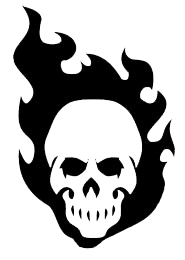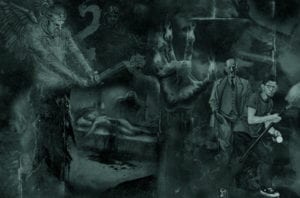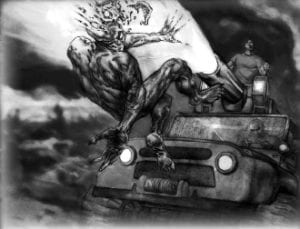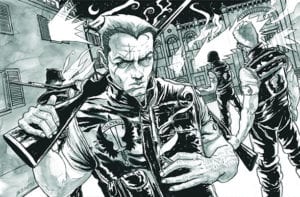This article will be the first in a short series about tabletop gaming topics. To begin with, I’d like to talk about a game that holds a special place in my heart, even if I haven’t had the opportunity to run or play it in a while – Hunter: the Vigil.
Let’s start with a bit of history. Hunter: the Vigil saw its release as part of the larger “New World of Darkness” universe as opposed to the “Old World of Darkness”, which had begun with Vampire: the Masquerade. The universe’s name is now “Chronicles of Darkness”, after some rebranding that I imagine is confusing to a lot of people.
The world of the Chronicles of Darkness looks much like our own…at first glance. Under the surface, the shadows are far deeper and crowded than we’re used to. Supernatural creatures and forces of all stripes hide from humanity, by choice or necessity. The teeming masses of mankind are largely ignorant of it, even as they fall victim to supernatural disaster. Yet even for those unaware, the world of the Chronicles is bleaker than ours.
 The player characters in Hunter are those mortal humans who saw past the curtain. The ways and reasons behind their awakening are myriad. Some survive a monstrous attack or lose loved ones to it. Others delve too deep into what they’d once dismissed as kooky conspiracy theories. Others still are initiated by others… hunters come from all walks of life. But one thing unites them all: they can’t and won’t lie to themselves any longer. Their motives are as varied as they themselves are, but all of them take up the Vigil. They hunt – for the monsters’ heads, their riches, or understanding.
The player characters in Hunter are those mortal humans who saw past the curtain. The ways and reasons behind their awakening are myriad. Some survive a monstrous attack or lose loved ones to it. Others delve too deep into what they’d once dismissed as kooky conspiracy theories. Others still are initiated by others… hunters come from all walks of life. But one thing unites them all: they can’t and won’t lie to themselves any longer. Their motives are as varied as they themselves are, but all of them take up the Vigil. They hunt – for the monsters’ heads, their riches, or understanding.
According to its sub-title, Hunter is a storytelling game of light and shadows. The imagery comes up throughout the book. The beginning of a hunter’s vigil is referred to as lighting a candle. Hunters are a thousand such candles in the night. Where other humans huddle around campfires, stalked by unseen shadows, hunters go out to pursue them.
As you can probably tell from my flowery prose, I like those themes a great deal. Hunter is about humanity taking control of their destiny in a world that stacks the deck against them. The original World of Darkness suffers greatly from mortal humans being powerless and irrelevant. The Chronicles of Darkness are better about it, but humanity is still nonetheless primarily victimized, reduced to bystanders and faceless masses. Hunter gives those faceless masses faces, voices and teeth.
Enough about themes, though. How does the game actually play? Its mechanics are best described as functional. They’re not fantastic, but they do their job well enough, barring some quirks. A second edition is in the works, but we know very little about it. While I hope it will remake Hunter to better serve its themes and purpose, it’s too early to say.
The basic organizational level of the game is a cell. It simply means a group of hunters working together in the same area. Thus, all characters in a given group of players are members of the same cell. The players and the Storyteller determine the nature of their relationship. They might know each other, but maybe it was the Vigil that brought them together.
Beyond cells, there are compacts and conspiracies. They’re two higher organizational levels of hunters. Compacts are loose confederacies of hunters, sharing information, aid and common ideals about the hunt. Conspiracies are more tightly-knit, with a real chain of command and defined goals. They also provide their members with Endowments, which are minor supernatural powers to give them an edge.
At least… in theory. The truth is that the “tiers of play” defined in the core rulebook are somewhat inconsistent. Especially as the game-line grew, the distinction between compacts and conspiracies grew muddied, and started to boil down to “does it give a supernatural endowment, or not?”. It’s something I hope the second edition clears up.
The differences between the “tiers” are primarily about the support network you have. A lone cell needs to rely on their own wits and resources. Belonging to a group can give you resources, support and knowledge, which is even more crucial than the other two. Hunters don’t become much less ignorant of the supernatural world when they become aware of it. And on the Vigil, ignorance kills.
My personal experience with Vigil encompasses mostly low-tier games, with local cells that had no support to speak of – I played in and ran such games. In all those cases, the characters found out about a potential supernatural threat in their area, investigated it and sought to fix the problem. This reactive approach is the most intuitive one when it comes to Hunter, but by no means the only one. Even local hunters can seek out the supernatural directly to destroy it, study it, or steal its power.
Compacts and conspiracies change the playing field. Not only do they provide hunters with support, but they also inform their actions with ideology, and sometimes provide a command structure that may simply order the player characters to do something. Conspiracies change the nature of the game even more, by providing their hunter with supernatural endowments, that allow them to fight monsters on much more even footing.

Here are some example Compacts:
- The Loyalists of Thule are a group descended from the German Thule-Gesellschaft. They bear the burden of having helped the Nazi party rise to power (which I understand is a historically dubious claim, but the game goes with it) and they focus on academic and occultist approach to monster-hunting. Later materials establish that many of them join the group for need of atonement – they’d already dabbled in the supernatural, and something went wrong. They’re one of the least violent hunter groups.
- The Union is a North American organization of working-class folk. They focus strongly on protecting their homes and workplaces, thus making them similar to local cells, simply with a vast support network of fellow Union members.
- The Long Night is a religious organization, and also American: the core Hunter book is unfortunately quite US-centric. They believe that they’re living in the time of Tribulation – the widespread existence of supernatural creatures is a sign that they must cleanse the Earth in preparation for the Second Coming. How they do it varies; the Long Night hunters can be the most ruthless or the most merciful of them all.
To compare, here are some of the conspiracies:
- The Malleus Maleficarum… also known as the Inquisition. They’re Vatican-sponsored Catholic witch-hunters. They wield Benedictions – prayers to the saints that invoke divine power… somehow. As befits their origin, they have a uniform view on supernatural beings. All of them are spawn of Satan, and need to be sent back to whence they came.
- The Lucifuge believe themselves to be descendants of Lucifer, the fallen angel. This may or may not be true… but they do share a lineage that’s not entirely human. And they do wield infernal powers, which they call rituals of Castigation. Ironically enough, they’re among the least-fanatical of Conspiracies. Many of them believe their job is to redeem their progenitor’s sin of rebellion against God. But don’t ask what happens to the people with their lineage who don’t want to join the conspiracy…
- The Cheiron Group is a pharmaceutical corporation whose interest in monsters goes along the lines one would expect from such a group. That is to say, they cut them up and make drugs. And they graft pieces of supernatural beings onto their field agents. Pulling the reins of the mega-corp are a mysterious board of directors. They’re not human, but the book leaves Storytellers to determine who they are and what they want.
There are many more in all the material released for Hunter, of course. If you can see at least three ways for those six groups alone to end up at each other’s throats… you’re quite correct. Ideological conflicts are a major part of the game. Not only between the compacts and conspiracies, but within them – or within single cells, even. Fighting against the crowded, stifling shadows of the Chronicles of Darkness’ world is an intense task. It brings out the worst and the best in people.
As such, for all the support a compact or conspiracy brings with it, it’s not all good. Belonging to a group ties you up in its politics. A small price to pay, one might think… or is it? Not to mention that some compacts and conspiracies break the blurry moral line of the game and jump straight into the “not much better than the monsters they hunt” territory.
The career of most people on the Vigil is short and brutal, one way or the other. Even with the support of compacts  and conspiracies, they go up against people and creatures wielding superhuman power.
and conspiracies, they go up against people and creatures wielding superhuman power.
It’s erroneous, however, to assume the danger is simply physical. For many people, monster-hunters are grim anti-heroes gunning down werewolves, vampires or fire-breathing albino crocodiles. And that is, indeed, something you can do in Hunter: the Vigil. But it’s by far not the be-all, end-all.
Supernatural beings (whether or not a hunter calls them monsters says a lot about them) hide among ordinary people. Some of them are physically human, for all intents and purpose: such as magic-users or cultists. The less-human ones can fool the throng of humanity around them with relative ease. Hunters need to move among that throng to find their quarry. And they will find that when push comes to shove, those they protect may not show them any kindness at all.
A howling, unholy cross between wolf and man, or a warlock shooting lightning from their fingers are insanely dangerous… but straightforwardly so. They can be fought, and beaten, with the right tactics and firepower. Especially if the hunters are packing endowments, the clever use of which can level the playing field. But the same wolf-man can also command invisible, intangible spirits to do his bidding, or shift back into a human form and disappear among the crowd. The warlock is a CEO of a major company, and can track the hunters’ every move in a sorcerous mirror. That’s a bit harder to counter using derring-do and know-how.
Playing Hunter: the Vigil is thus very much playing the underdog. Sure, hunters belonging to conspiracies tend to have better equipment, more information, and magic powers, but they also tend to go against proportionally larger threats. So, what edges do they have?
The first is “risking Willpower”. Willpower is a resource every character in Chronicles of Darkness has – a pool of points they can spend to increase the number of dice they roll when attempting a task. This represents increased effort and determination to succeed. Hunters can declare that they “risk” such a point. It allows them to reap more benefits and regain spent willpower. But if the task (be it an attack, jumping over a fence or trying to plead with a victim of mind control) fails despite it, the failure is much more spectacular than normal. This is meant to portray the burning, desperate drive that hunters share, as they strive in the face of overwhelming odds.
Another edge hunters have are tactics. After all, numbers are humanity’s greatest advantages over things that go bump in the night. Hunters frequently go up against lone monsters – isolating them from allies is a vital skill for hunters who want to keep hunting. Tactics are operations that the hunter cell trains and drills until they can perform them immediately when the signal is given. This includes efficiently staking a vampire, corralling an invisible monster so it can’t get away, or using one member of the cell as bait so the rest can ambush a monster or get away.

The third advantage hunters can seek, apart from their own cunning and inventiveness, are endowments the conspiracies provide. They’re a variety of supernatural powers or items available to the members, apart from Task Force Valkyrie, which uses cutting-edge technology designed to counter supernatural powers. They help level the playing field, but they come with baggage. The primary being… how do hunters who use supernatural powers differ from some monsters?
That’s not the main moral quandary hunters face, though. The game provides them with abundance. It is possible to treat Hunter as a guilt-free romp, kicking down doors and shooting monsters in the face. But that’s not really the game’s design. It would rather delve into all the nasty moral and mental implications of hunting monsters. Hunters run the gamut from desperate people doing what they must, grim fanatics executing monsters (and humans) without remorse, or people with their own dirty agenda.
Some “monsters” are just that, certainly: a hell-hound or shambling thing sewn from corpses. But many supernatural beings in the Chronicles of Darkness were once human, and are still people for all intents and purposes. Will a hunter mind that? Or just treat them as a disease they must purge? People manage to rationalize wiping out their fellow human beings this way. Applying the same logic to those who aren’t, strictly speaking, human, is a small step. To say nothing of the other acts a hunter may commit. The Vigil can demand stealing, breaking and entering, spying, threatening… many other acts that most people instinctively object to.

A hunter may rationalize it all – there’s a system for it that it would take too much time to get into – but it leaves scars on the psyche. Although I said that a hunter’s career is often brief, being killed or incapacitated isn’t the only way it can end. Many hunters simply break down under the stress, either becoming mentally ill or trying to go back to their old life.
Yes, old life. Or, well, not so old. Hunters can’t very well go off the grid and lock themselves up in a basement, with a shotgun and a lifetime supply of canned food, can they? Members of some conspiracies can afford to hunt monsters full-time, as it were…Cheiron Corp comes to mind. But most of them have lives. Friends, families, spouses, children, jobs. They can’t readily abandon them once they realize what’s out there, even if they want to. It’s ironic: hunters are human, so they don’t need to pass as such, the way some supernatural beings do. But they also don’t have all the supernatural powers that make living a double life easier.
It’s a bleak picture I’ve painted here. Hunters are mortal humans going up against supernatural beings, armed with scraps of knowledge, mortal weapons and sometimes pilfered bits of magic. And bleak it is. But the hunt goes on.
This duality is how I wanted to end my endorsement for Hunter: the Vigil. It’s a very dark game, from the player characters’ point of view. But as you scale up… it’s about humanity’s only line of defence against forces malicious at worst and arrogantly uncaring at best. And there are always hunters. Some of them die, others go mad. Entire organizations are destroyed, corrupted or made to serve monsters. But others always step to take their place – sometimes inspired and spurred on by their failure. Hunters die; the Vigil goes on, a thousand candles in the dark.
Images courtesy of Onyx Path.

